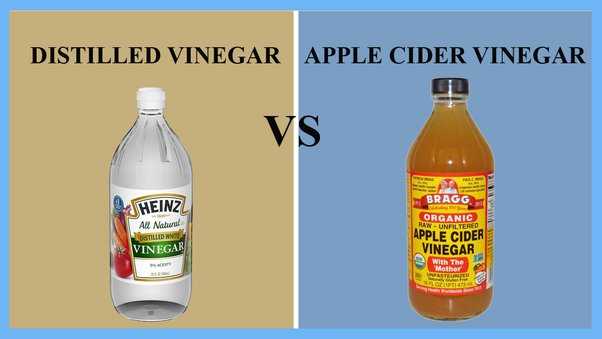




When it comes to cleaning around the house, many people turn to vinegar as a natural and effective solution. But with so many different types of vinegar available, it can be difficult to know which one is the best choice. Apple cider vinegar and white vinegar are two popular options, each with their own unique properties and benefits. In this article, we will compare these two types of vinegar and help you determine which one is better for your cleaning needs.
Apple cider vinegar is made from fermented apple juice and has a slightly sweet and fruity flavor. It is known for its natural antibacterial and antifungal properties, which make it a popular choice for cleaning and disinfecting. Apple cider vinegar is also rich in enzymes and acids that can help break down dirt and grime, making it an effective cleaner for a variety of surfaces.
On the other hand, white vinegar, also known as distilled vinegar, is made from distilled grain alcohol. It has a strong, pungent odor and a slightly acidic taste. White vinegar is known for its powerful cleaning properties and is often used as a natural alternative to harsh chemical cleaners. It can effectively remove stains, grease, and odors, making it a versatile cleaner for a wide range of household tasks.
Both apple cider vinegar and white vinegar can be used for cleaning, but they have slightly different properties and uses. Apple cider vinegar is a milder and more gentle option, making it a good choice for delicate surfaces or for those with sensitivity to strong odors. White vinegar, on the other hand, is a stronger and more abrasive cleaner, making it suitable for tougher stains and grime. Ultimately, the choice between apple cider vinegar and white vinegar will depend on your personal preferences and cleaning needs.
It’s also worth noting that both apple cider vinegar and white vinegar can be used in a variety of homemade cleaning solutions. You can mix them with water or other natural ingredients to create an all-purpose cleaner, a window cleaner, or even a fabric softener. Experiment with different ratios and combinations to find the perfect cleaning solution for your home.
The Benefits of Cleaning with Vinegar
- Vinegar is an all-natural and non-toxic cleaning agent, making it a safe option for people and pets.
- Vinegar is an effective disinfectant and can kill many common household bacteria and viruses.
- Vinegar has strong antibacterial properties, making it ideal for cleaning kitchen countertops, cutting boards, and other food preparation surfaces.
- Vinegar can help remove tough stains and grease from surfaces like clothing, carpets, and upholstery.
- Vinegar is a natural deodorizer and can help eliminate unpleasant odours in the home, such as those caused by cooking, pets, or mildew.
- Vinegar is an affordable cleaning solution that is readily available in most households.
- Vinegar can be used as a natural alternative to harsh chemical cleaners, reducing exposure to potentially harmful substances.
- Vinegar can be used to clean a wide range of surfaces, including glass, tile, stainless steel, and wood.
- Vinegar is environmentally friendly and biodegradable, making it a more sustainable choice for cleaning.
Understanding Apple Cider Vinegar
Apple cider vinegar is a type of vinegar that is made from fermented apples. It is a popular ingredient in various recipes and has also gained traction in the world of cleaning due to its natural cleaning properties. Here’s what you need to know about apple cider vinegar and how it can be used for cleaning purposes.
Production Process
Apple cider vinegar is made through a two-step fermentation process. First, apples are crushed and the juice is extracted. The juice is then mixed with bacteria and yeast, which ferments the sugars in the juice and turns them into alcohol. In the second step, the alcohol is further fermented by acetic acid-forming bacteria, which converts it into vinegar.
Acidic Properties

Apple cider vinegar has a high concentration of acetic acid, which gives it its characteristic smell and taste. This acid is also the reason why apple cider vinegar is an effective cleaner. The acidity helps break down dirt, grime, and grease, making it easier to remove from surfaces.
Uses in Cleaning

Apple cider vinegar can be used for various cleaning tasks around the house. Some common uses include:
- Surface cleaning: Apple cider vinegar can be diluted with water and used to clean countertops, floors, and other surfaces. It helps remove stains and odors.
- Window cleaning: A mixture of apple cider vinegar and water can be used to clean windows and glass surfaces, leaving them streak-free.
- Laundry: Adding a cup of apple cider vinegar to your laundry can help remove odors from clothes and towels.
- All-purpose cleaner: A mixture of apple cider vinegar, water, and a few drops of dish soap can be used as a natural all-purpose cleaner.
Precautions
While apple cider vinegar is generally safe to use for cleaning purposes, there are a few precautions to keep in mind:
- Test on a small area: Before using apple cider vinegar on a surface, it’s a good idea to test it on a small, inconspicuous area to ensure that it doesn’t cause any damage or discoloration.
- Avoid using on certain surfaces: Apple cider vinegar is acidic and can potentially damage certain surfaces like marble or natural stone. It’s best to avoid using it on these surfaces or to dilute it heavily.
- Do not mix with bleach: Mixing apple cider vinegar with bleach or any other cleaning products that contain chlorine can create toxic fumes. It’s important to avoid mixing these substances.
Conclusion

Apple cider vinegar is a versatile and natural cleaner that can be used for a variety of cleaning tasks. It is effective in breaking down dirt and grime, and it can be a great alternative to chemical-based cleaning products. However, it’s important to use it responsibly and take the necessary precautions to ensure that it is used safely on different surfaces.
The Power of White Vinegar
White vinegar is a versatile and powerful cleaning agent that can be used for a variety of purposes. Here are some of the reasons why white vinegar is a great choice for cleaning:
- Antibacterial properties: White vinegar has natural antibacterial properties that make it effective in killing germs and bacteria. It can be used to clean and disinfect surfaces, such as countertops, cutting boards, and bathroom fixtures.
- Safe and non-toxic: Unlike many commercial cleaning products, white vinegar is non-toxic and safe to use around children and pets. It doesn’t contain harsh chemicals that can be harmful to your health or the environment.
- Cost-effective: White vinegar is affordable and readily available, making it an economical choice for cleaning. You can buy it in large quantities and use it for various cleaning tasks without breaking the bank.
- Deodorizing properties: White vinegar is effective in neutralizing odors. It can be used to remove unpleasant smells from various surfaces, including carpets, upholstery, and kitchen appliances.
- Stain removal: White vinegar can be used to treat and remove stains from different surfaces, including fabrics and carpets. It can help lift and dissolve stains, leaving them looking cleaner and fresher.
- Multi-purpose cleaner: White vinegar can be used for a wide range of cleaning tasks. From kitchen and bathroom surfaces to windows and floors, white vinegar can tackle various types of dirt and grime.
In conclusion, white vinegar is a powerful and versatile cleaning agent that offers many benefits. Its antibacterial properties, non-toxic nature, affordability, and versatility make it an excellent choice for all your cleaning needs.
Choosing the Right Vinegar for Different Cleaning Tasks
When it comes to cleaning, vinegar is a versatile and natural solution that can be used for a wide range of tasks. However, not all vinegars are created equal, and choosing the right vinegar for the specific cleaning task at hand is important. Here, we’ll explore the differences between apple cider vinegar and white vinegar and their suitability for different cleaning tasks.
Apple Cider Vinegar

Apple cider vinegar is made from fermented apple juice and has a slightly fruity aroma. It is milder in acidity compared to white vinegar, typically containing around 5% acidity. This makes it a suitable choice for a variety of cleaning tasks, especially those that are more delicate.
- Glass Cleaning: Apple cider vinegar can be diluted with water to create a streak-free glass cleaner. Use a spray bottle and wipe with a lint-free cloth for best results.
- Surface Cleaning: Due to its mild acidity, apple cider vinegar can be used to clean surfaces such as countertops, appliances, and even bathroom fixtures. Dilute with water and wipe with a clean cloth.
- Removing Odors: Apple cider vinegar can help neutralize odors in various areas of the house, including the kitchen, bathroom, and pet areas. Simply spray or wipe down the surfaces with a vinegar-water solution.
White Vinegar
White vinegar, also known as distilled vinegar, is made from fermented grain alcohol. It has a sharp and pungent smell, but its higher acidity, typically around 5-8%, makes it more suitable for heavy-duty cleaning tasks.
- Disinfecting: White vinegar is an excellent natural disinfectant due to its high acidity. It can be used to clean and disinfect cutting boards, kitchen sinks, and other surfaces that come into contact with raw food. Dilute with water and wipe or soak the surfaces for a few minutes.
- Removing Stains: White vinegar can be effective in removing stains from various surfaces, including carpets, fabrics, and upholstery. Mix with water and blot the stain with a clean cloth or sponge.
- Unclogging Drains: As a natural alternative to harsh chemical drain cleaners, white vinegar can help unclog drains. Pour a mixture of vinegar and baking soda down the drain, followed by hot water.
Conclusion
Both apple cider vinegar and white vinegar have their own strengths in cleaning tasks. Apple cider vinegar is milder and suitable for general cleaning purposes, while white vinegar with its higher acidity is better for heavy-duty cleaning and disinfecting. It’s important to consider the specific cleaning task and choose the vinegar that best suits the job at hand.
Final Verdict: Apple Cider Vinegar or White Vinegar?
After exploring the uses and benefits of apple cider vinegar and white vinegar, it is clear that both options have their own advantages.
Apple cider vinegar is known for its natural cleaning properties and its ability to effectively remove stains and odors. It is particularly effective in removing dirt and grime from surfaces, such as countertops, floors, and windows. Additionally, apple cider vinegar can be used as a natural disinfectant, making it a great option for cleaning and sanitizing various areas in your home. Moreover, apple cider vinegar has a pleasant scent, which can leave your home smelling fresh and clean.
White vinegar, on the other hand, is a powerful cleaning agent that has been used for generations. Its high acidity makes it effective in removing tough stains, grease, and soap scum. White vinegar can be used to clean a variety of surfaces, including glass, metal, and porcelain. It can also be used as a natural fabric softener, making it a versatile option for laundry. However, white vinegar has a strong smell that some find unpleasant.
Ultimately, the choice between apple cider vinegar and white vinegar will depend on your personal preferences and the specific cleaning tasks at hand. If you prefer a natural and pleasant-smelling option, apple cider vinegar may be the better choice for you. On the other hand, if you need a powerful cleaner that can tackle tough stains and odors, white vinegar may be more suitable.
Both apple cider vinegar and white vinegar are affordable and readily available, making them accessible options for cleaning and disinfecting your home. Experimenting with both options may help you determine which vinegar works best for your cleaning needs.
Remember to always dilute vinegar with water before using it for cleaning, and test it on a small, inconspicuous area before applying it to a larger surface.
FAQ
What is the difference between apple cider vinegar and white vinegar?
Apple cider vinegar is made from fermented apples, while white vinegar is made from distilled grain alcohol. This difference in ingredients gives each vinegar a slightly different taste and smell. Apple cider vinegar has a fruity flavor and a mild, sweet aroma, while white vinegar has a more sharp and pungent taste and smell.
Can apple cider vinegar be used for cleaning purposes?
Yes, apple cider vinegar can be used for cleaning. It is a natural and effective cleaning agent that can be used to remove dirt, stains, and odors from various surfaces. Its acidity helps to break down dirt and grime, making it a popular choice for non-toxic cleaning solutions.
Is white vinegar better than apple cider vinegar for cleaning?
Both white vinegar and apple cider vinegar are effective for cleaning, but they have slightly different properties that make them suitable for different purposes. White vinegar is more acidic than apple cider vinegar, which makes it a stronger cleaning agent. It is particularly effective for removing tough stains and disinfecting surfaces. However, apple cider vinegar has a more pleasant scent and can be used for cleaning tasks where a mild acidity is sufficient.
Can apple cider vinegar be used as a natural alternative to chemical cleaning products?
Yes, apple cider vinegar can be used as a natural alternative to chemical cleaning products. It is non-toxic and environmentally friendly, making it a safer choice for those who are concerned about the impact of chemical cleaners on their health and the environment. However, it’s important to note that apple cider vinegar may not be as effective as chemical cleaners for certain tough cleaning tasks, so it’s always a good idea to test it on a small, inconspicuous area before using it on a larger scale.











